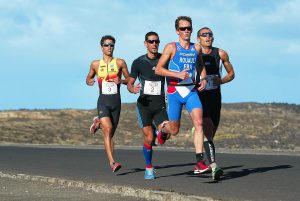Von Collins is an accomplished triathlete and endurance cyclist, and the author of four fitness and training books: Smarter Running, Your First Triathlon Guide, Fit Foods, and 30 Rut-Busting Workouts. He has been cited as a triathlon, cycling, and fitness expert by Healthline, CNET, Forbes, Eat This, Not That and other major outlets.
When I entered the triathlon world more than a decade ago, I wasn’t sure what to expect. I knew I would get in better shape, I was pretty sure I would enjoy the competitive aspect of it, and I was admittedly anxious about becoming a swimmer and a road cyclist – two things that were new to me. Now, many years and races later, I can say that deciding to do triathlons was one of the best decisions that I ever made. I just wish there were a few things I wish somebody would have told me during that first season. Perhaps someone did tell me, and I just didn’t listen.
Here are seven things I wish I would have known as a new triathlete.
It is all about staying healthy.

Staying health is a big part of triathlon! Some new triathletes are trying to be finely-tuned athletes, applying their previous training a discipline to a new sport. Others are simply trying to find a way to get back in shape, and have fun doing it. Maybe others have “do a triathlon” on their bucket list and want to do just one, and then move on to the next thing. Regardless of where you fall on the spectrum, know one thing: The name of the game is to train safely and not get injured. During the first couple years of doing tris when I adopted the sport with vigor, I found myself getting hurt far too often. Tight hamstrings, IT Band issues, and a shoulder that was telling me my swim stroke was off. I had to fundamentally adjust my training, because if you are not able to compete in races, it doesn’t matter how fast you are becoming. The lesson: Ramp-up your training gradually, stretch, and pay attention to your body. Goal #1 is to be able to race. Racing faster is great, but doing so requires you to be healthy.
Nutrition matters.
When I was a newer triathlete, I had some people tell me that you can gut out a Sprint triathlon regardless of how you feel or the conditions. Most of the triathlon nutrition articles focused on the HIM and IM distance races. Then I did a sprint triathlon on a hot day, and bonked. Even if you are doing a Sprint or Olympic race, understanding how to fuel your body is a core skill of triathlon. A race car is at its most efficient weight when it has enough fuel to finish the race, but not so much that it gets bogged down. Hydration is extremely important, and having the right energy reserve is critical whether you are doing a spring or a Half Iron. Experiment with different approaches, and find a system that works for you. For some, it will be the perfect pre-race snack. For others, having some gel while on the course is the right answer. Practice with nutrition being part of your workouts. Remember the mantra: “Nothing new on race day.” Make sure that that way you plan to hydrate and energize yourself on race day is something that your body will recognize and be able to capitalize on.

Nutrition during the race is a factor, even in sprint triathlons. Rest is a big part of a good training plan.
Nearly every triathlete hits a phase, once addicted to the sport, where it feels unnatural to not workout. Even if it is the mythical “recovery run”, many triathletes feel better knowing they did something rather than just rest. This is the wrong approach. Rest is not only a net positive, but it is something you should proactively work into your training plan, with a little more frequency than you probably think you need. I was reminded of the need for rest one season after doing my “A-Race”, a challenging Olympic course in early June. I trained hard, and did very well. After the race, I travelled in Europe for a couple weeks. I did not even bring running shoes. I didn’t do a single workout, other than walking around old world cities, for more than 15 days. When I got back, I started doing a few runs and bike rides, and then on a whim decided to do a longish Sprint. Despite not training hard for nearly a month, it was the fastest bike pace I have ever turned in. The lesson: Taking time off is necessary, and even building extended time off between races can actually be a great thing.
Open water swimming really is different.
I went for one open water swim in my wetsuit before my first-ever race. It was probably a 100 meter test swim, just around the boundary of a local swimming beach. Every little bit helps, but in retrospect I should have done much more. Swimming in a pool is great, and an important way to build up your stamina and good technique. If your race is going to be in open water, though, there is really no substitute for doing some open water swims. Your wetsuit will feel a little weird at first, and it is good to experience a variety of conditions – wind, sun (i.e. glare), cold, heat. I did just fine in my first few open water swims, but if I could go back and do it again I would probably insist on no less than four open water practice sessions before attempting my first race. If you are reading this before your first race and don’t have time to do four, don’t stress…. But try to do at least one.

Buying quality gear from the start might save you money in the long run. Don’t cheap out on gear.
This is probably the one tip on this list that will get the most debate. Can you do a triathlon on a 20-year old mountain bike, without a wetsuit, and in running shorts? Of course you can! And I would much rather have you do that then not try doing a triathlon at all. You see everything you could imagine at a race when it comes to gear and equipment. If I could go back, though, I would have invested just a little more in my wetsuit, and bike more suited for triathlons. What happened is that I bought some very basic gear for my first race, and then I got hooked. So I upgraded a little for my 2nd race, and as I got into my 2nd, 3rd, and 4th seasons I felt the need to upgrade again and again. The result? By the time I was in my 5th season. I think I was on my 4th bike and my 4th wetsuit. Garbage-in, garbage-out as the saying goes. I would have been better off investing in a little better gear at the outset. Unless you are positive that you are only doing one triathlon, perhaps to check it off your bucket list and then be done, consider getting some mid-range quality gear. The chances are you will find other uses for the gear, even if it is not in triathlon!
Come race day, you are all a team.
I remember being nervous about my first race. It is completely normal, and I still get butterflies before every race even though I have now done dozens of them. If I don’t feel some butterflies, I actually get worried that I am not mentally ready for the race. It is important to want to do well. If I could go back, though, I wish I would have known that race day is one of the most supportive environments you can imagine. Don’t get me wrong – people are competing, and there will be winners. But if you have the courage to sign up for a race, and have the discipline to train for one, by the time you get to race day you are among a team of like-minded people. The goal is for everyone to maximize their potential, have fun, and maybe turn in a PR. Don’t stress about what race day will be like – you will no doubt have a support system and cheering fans even if you don’t know another soul there.
Other triathletes love to share their knowledge.

At the end of the day, triathlon is really a community sport. As a new triathlete, I remember consuming online resources (like this one) and triathlon training books. I would talk with my spouse about my training and race strategy. But one thing I did not do is talk much with other triathletes. That was a mistake. I felt a little chip on my shoulder to make it look like I totally knew what I was doing. So many triathletes – neighbors, friends, even people at the local tri shop – love to talk about the sport, and they don’t look down upon a newbie. Most triathletes know that for the sport to sustain and endure, each race needs a healthy number of first-timers. Any question is fair game, whether it is about equipment or how a race goes down or anything else. Don’t hesitate to reach out to people and ask them about triathlons and training – most will be thrilled to share everything they know, even if they have done 5 Ironmans and look like Usain Bolt.








im training for my first Olympic triathalon . I have done 6 sprints . For the open waterswim I find the hardest . Anxiety , freak out first 50 yards . What can I do different not to have this feeling bc doing this I use up a lot of energy . Or is practice in the open water as much as can before race day to get the confidence ! Please advise …….. thanks in advance Tom
Don’t panic, there will be others like you. Focus on your breathing. If you feel over whelmed, stop,take a breath, sight the bouy and carry on. I was like you, especially in choppy conditions. Rely on your training, rely on your stroke. Remember there is always water safety cover. Get as much practice in as you can. Learn to sight, as you can then break the swim down into smaller chunks by setting your goal to get to each bouy in turn. Hope this helps, most of all enjoy it. Good luck
What bike would be good to invest in? Also, should I invest in a tri suit or a wet suit? I don’t really want to change clothes when I transition to the bike after a swim and the tri suit might be the better option.
I would assume you are freaking out because you’re not a confident swimmer… the more time you spend in the water , especially open water the more comfortable you will get… if you have a wetsuit on and it fits comfortably with no restrictions around your neck (inhibiting your breath) you should become even more confident… if you are swimming indoors, get in the habit of sharing a lane with someone so you are always training with someone cramping your space…. if you’re not racing and you are doing competitions for recreation, start in the back…. open water swimming is always going to feel like a street fight if you decide to be in the middle… unfortunately triathlon has become a business and the mass swim starts are not to benefit you or your safety…. the swim will always be an anxiety machine…. I always approached it with the mindset , that I’m going to punch and kick whoever gets in my way as hard as I can and they’ll never know that it was intentional or not…. hope that helps 👌🏽👌🏽👍🏼👍🏼🤣🤣🤣
Yes Tom, I have experienced nearly disabling anxiety in near all of my 10 or so triathlons, except one. I was only comfortable in the water on my first (and only) Half Ironman race, and I attribute it to the increased item water swim I “felt” I needed due to the increased length, over the shorter distances I’d done. The following year I returned to shorter races, less often water prep, and a return to swim anxiety. Covid restrictions forced me outside for swimming these last two months, and 7-8 weekly swims later… often water isn’t bothering me! *Experience => Confidence
Go get ’em brother!
Try and stay on the outside of the pack till the first turn. You will swim a bit longer but that’s not a train smash. Also….. Slow down…. Breath deep, turn your head and breath…. After the first buoy you can smash it!!!!
You are correct about hydration/nutrition. The paucity of info on standard distance races seems to be a consequence of the focus in the US on ultra distance races like IM and 70.3. All one has to do is watch an ITU race and watch the pros fueling on the bike to know hydrating and fueling is important in all distances.
I differ with the “nothing new on race day,” to a degree. Race day is different, anyway because it comes after a taper. It is “new” no matter what. I use new gear for races all of the time. Nutrition is another matter, of course. It isn’t a good idea too throw your stomach a curve ball on race day.
GREAT ARTICLE thank you all. My advice would be to enjoy the training otherwise you’ll end up resenting it. Throw in new run routes track and non track. Cycling club a must and can’t say enough how important the sighting is – break it in to stages don’t follow the person in front you’ll likely end up off course
This was a very good article. Thank you.
One thing to add: if there’s a local club, join it. Go to the meetings (my first one had a newbie series of meetings and group open water swims…) And do the club races. They make awesome practice and low threat.
Excellent advice!
This article and all comments below are really insightful for what to expect.
Training for triathlons is a terrific method to remain in good health. You are working different muscle groups during the three disciplines so your overall conditioning remains balanced (not putting disproportionate stress on older knees)
This is a great article. Sharing is caring in a FitFamily. I am 46 and will be checking off that fitness goal off my list in October. My body has taken a beating over my military time and my L4-5 is not best friend. I have been trying to find a good entry-level bike to begin training on. I live in AZ and we have a lot of closed loops for training. Does anyone have any ideas for me? Thank you!